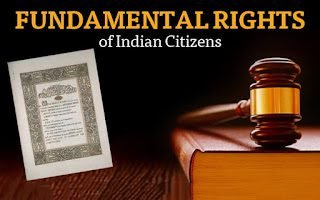Fundamental Rights
The Fundamental Rights are enshrined in Part III of the
Constitution from Articles 12 to 35. In this regard, the framers of the
Constitution derived inspiration from the Constitution of USA. Originally, the
Constitution provided for seven Fundamental Rights. At present, there are only
six Fundamental Rights. Part III of the Constitution is rightly described as
the Magna Carta of India. While Fundamental Rights are available to all
persons, certain Fundamental Rights are available only to Indian Citizens.
Constitution from Articles 12 to 35. In this regard, the framers of the
Constitution derived inspiration from the Constitution of USA. Originally, the
Constitution provided for seven Fundamental Rights. At present, there are only
six Fundamental Rights. Part III of the Constitution is rightly described as
the Magna Carta of India. While Fundamental Rights are available to all
persons, certain Fundamental Rights are available only to Indian Citizens.
1.
RIGHT TO EQUALITY:
RIGHT TO EQUALITY:
·
Art. 14 – Equality before law.
Art. 14 – Equality before law.
·
Art. 15 – Prohibition of discrimination on grounds
of religion, race, caste, sex or place of birth.
Art. 15 – Prohibition of discrimination on grounds
of religion, race, caste, sex or place of birth.
·
Art. 16 – Equality of opportunity in matters of
public employment.
Art. 16 – Equality of opportunity in matters of
public employment.
·
Art. 17 – Abolition of Untouchability.
Art. 17 – Abolition of Untouchability.
·
Art. 18 – Abolition of titles except military and
academic.
Art. 18 – Abolition of titles except military and
academic.
2.
RIGHT TO
FREEDOM:
RIGHT TO
FREEDOM:
·
Art. 19 – Freedom of speech and expression,
assembly, association, movement, residence and profession.
Art. 19 – Freedom of speech and expression,
assembly, association, movement, residence and profession.
·
Art. 20 – Protection in respect of conviction for
offences.
Art. 20 – Protection in respect of conviction for
offences.
·
Art. 21 – Protection of life and personal liberty.
Art. 21 – Protection of life and personal liberty.
·
Art. 21A – Right to elementary education.
Art. 21A – Right to elementary education.
·
Art. 22 – Protection against arrest and detention
in certain cases.
Art. 22 – Protection against arrest and detention
in certain cases.
3.
RIGHT AGAINST
EXPLOITATION:
RIGHT AGAINST
EXPLOITATION:
·
Art. 23 – Prohibition of traffic in human beings
and forced labour.
Art. 23 – Prohibition of traffic in human beings
and forced labour.
·
Art. 24 – Prohibition of employment of children in
factories, etc.
Art. 24 – Prohibition of employment of children in
factories, etc.
4.
RIGHT TO
RELIGION:
RIGHT TO
RELIGION:
·
Art. 25 – Freedom of conscience and free
profession, practice and propagation of religion.
Art. 25 – Freedom of conscience and free
profession, practice and propagation of religion.
·
Art. 26 – Freedom to manage religious affairs.
Art. 26 – Freedom to manage religious affairs.
·
Art. 27 – Freedom from payment of taxes for
promotion of any religion.
Art. 27 – Freedom from payment of taxes for
promotion of any religion.
·
Art. 28 – Freedom from attending religious instruction
or worship in certain educational institutions.
Art. 28 – Freedom from attending religious instruction
or worship in certain educational institutions.
5.
CULTURAL &
EDUCATIONAL RIGHTS:
CULTURAL &
EDUCATIONAL RIGHTS:
·
Art. 29 – Protection of language, script and
culture of minorities.
Art. 29 – Protection of language, script and
culture of minorities.
·
Art. 30 – Right of minorities to establish and
administer educational institutions.
Art. 30 – Right of minorities to establish and
administer educational institutions.
6.
RIGHT TO CONSTITUTIONAL
REMEDIES:
RIGHT TO CONSTITUTIONAL
REMEDIES:
·
Art. 32 – It allows individuals to seek redressal
for the violation of their fundamental rights.
Art. 32 – It allows individuals to seek redressal
for the violation of their fundamental rights.
(Did You Know:
Right to Property (Art. 31) was deleted from the list of Fundamental Rights by
the 44th Amendment Act, 1978. It is made a legal right under Article 300-A in
Part XII of the Constitution.)
Right to Property (Art. 31) was deleted from the list of Fundamental Rights by
the 44th Amendment Act, 1978. It is made a legal right under Article 300-A in
Part XII of the Constitution.)



